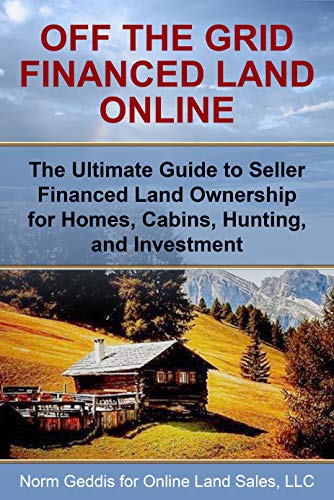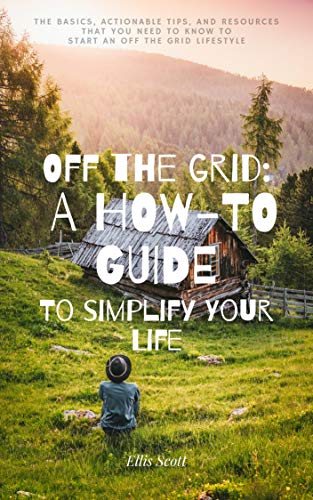Top 8+ Books About “Off The Grid Living” (2024)
Ever wondered how you could live in the mountains or simply in the nature?
“Living off the grid” refers to a lifestyle that is self-sufficient and independent from society's traditional power and water systems. This lifestyle has become increasingly popular in recent years as people seek a simpler way of life, closer to nature and away from the demands of modern society. To help guide you on your journey, we have compiled a list of the top books about off-the-grid living.
These books offer practical advice, tips, and inspiration for anyone interested in this alternative way of life. Whether you're a seasoned off-grider or just curious about the lifestyle, this list has something for everyone.
This collection of off grid living books will help you make your dreams reality.
The list is live on Goodreads, feel free to vote on it.
What Are Most Engaging Off Grid Living Books To Read Before Start Your Own Journey?

The Ultimate Prepper's Survival Bible, by Bond Pearson
This guide, which expertly synthesizes the wisdom from 14 different prepping and survival books, is designed to be the most comprehensive resource you'll need to confidently face any emergency situation. The guide offers a complete, family-oriented action plan aimed at helping you and your loved ones survive and thrive during unexpected disasters. Whether you're located in the suburbs, a big city, or the wilderness, this guide provides practical advice on essential skills such as stockpiling food, rendering emergency medical care, cooking meals from everyday ingredients, and mastering DIY survival skills. The guide is designed to be a valuable companion for anyone seeking the security and peace of mind that comes with having a preparedness plan.
Within this Prepper’s Survival Bible, readers will discover a plethora of actionable steps they can start taking now to prepare for a crisis, regardless of budget or location. The book includes tried-and-tested advice for stockpiling resources, canning and cooking prepper-friendly meals, easily purifying water, finding natural medicines, thriving in the wilderness, and mastering practical DIY and emergency first aid skills to keep loved ones safe. Additionally, the guide encourages readers to take proactive steps towards building a prepper community, protecting their neighborhoods, generating energy, homesteading, and more. Whether faced with economic collapse, a natural disaster, war, or more extreme scenarios, this ultimate prepper's guide is crafted to equip readers with the tools and knowledge to be fully prepared.

Off-Grid Living 101, by Forrest Robertson
Off-Grid Living 101 is an great guide for those dreaming of a self-sufficient, off-grid homestead but lack the necessary knowledge to make it a reality. This comprehensive resource covers a range of crucial topics including selecting the ideal location, establishing a productive garden, raising livestock, and implementing effective methods for water management.
It offers insights into generating income from your homestead, utilizing byproducts efficiently, and setting up off-grid power systems. The book is tailored to help individuals overcome common challenges such as lack of expertise in food production, animal care, and land acquisition, ensuring that the dream of off-grid living is attainable regardless of one's current situation.

Off Grid Living: Step-By-Step Back to Basics Guide To Become Completely Self Sufficient in as Little as 30 Days, by Small Footprint Press
This 171 pages book is a guide for individuals interested in living a self-sufficient life without giving up luxuries or technology. The book covers various topics such as finding the perfect location for an off-grid home, different water systems, electricity options using solar, wind, and geothermal sources, growing organic food, and the best US states for off-grid living.
The author provides tips for becoming completely self-sufficient and saving money. The book aims to provide comprehensive information and practical tips for those seeking to live off the grid.

Off the Grid Financed Land Online, by Norm Geddis
Do you dream of escaping the suburbs and carving out a new life for yourself in the country? Are you searching for the best ways to find the ideal rural land to build your dreams? Then this book is for you!
Millions of people dream of striking out and enjoying a simpler, slower pace of life in the country, but many don’t know where to begin. If you want to reconnect with nature, live like your forefathers, and free yourself from the chaos of the modern world, how can you find and purchase the right land to build on?
Specially crafted by the real estate experts at Online Land Sales, LLC, this ultimate guide explores how you can finally ditch the suburbs and buy the ideal land for your rural home, hunting lodge or cabin. Breaking down the details of buying land online, the ins and outs of seller-financed land, and a wealth of brilliant advice for off the grid living, this handbook arms you with the essential knowledge you need to turn your dreams into reality.

Living Off the Grid, by Gary Collins
In Living Off the Grid, author Collins provides a comprehensive examination of the practical aspects of off-grid living. The book is written in a conversational tone, making complex subjects easy to understand and apply. The author's goal is to help readers feel confident about the transition to off-grid living by breaking down the necessary steps and sharing practical tips and advice. By the end of the book, readers will have a clear understanding of what this unique lifestyle looks like in practice and will feel more relaxed and confident about taking the next step.
Living Off the Grid is a must-read for anyone looking to live a life of freedom, free from the constraints of modern society.

Off Grid Living, by Feed the Knowledge Publishing
This guide from Feed the Knowledge Publishing is a comprehensive manual designed to assist individuals in achieving self-sufficiency and living off the grid. Understanding the daunting nature of this endeavor, the book offers detailed, step-by-step instructions covering a wide range of topics essential for a sustainable lifestyle. These include setting up a home, producing energy, managing water and waste, and growing and storing food.
The guide is enriched by the hands-on experiences of the authors, who have themselves lived off the grid and helped others do the same. It aims to equip readers with new skills, lower their carbon footprint, and provide the confidence to avoid common mistakes. The book is user-friendly, catering to beginners with no prior experience in self-sufficiency, ensuring that even those new to concepts like building or using photovoltaic panels can easily understand and apply the information provided.

Going Off the Grid, by Gary Collins
Going Off the Grid is a comprehensive guide to creating a self-sufficient, off-the-grid lifestyle. The author, Collins, provides step-by-step instructions and practical tips to help readers simplify their lives and reduce stress. The book covers a wide range of topics, including home construction, energy alternatives, sewage disposal, and internet access. Whether you are looking to escape the city and live in the wilderness or simplify your life in the suburbs, this book provides the information you need to get started.
The author shares their own experiences and expertise, and provides detailed explanations and examples to help readers understand the basics of off-the-grid living. Whether you are a beginner or an experienced homesteader, Going Off the Grid is an essential resource for anyone interested in creating a self-sustaining refuge in the great outdoors.

Off The Grid: A How-To Guide To Simplify Your Life, by Ellis Scott
Imagine living off the grid, afar from the city with stress free and calm environment that will lead you to peaceful life. Imagine living off the grid with minimal knowledge about it, but able to do so like an experienced one.
In this modern world, with the earths limited resources quickly disappearing due to our increasing demand for more of everything, many of us see the eventuality being that these resources will run out, whether it is a decade or a century from now, it is commonly accepted that it will happen. Aside from being passionate and committed to self-sufficient living, this is the main reason why those who live off grid have turned to this way of life.

Tips for Off Grid Living, by Kelsy Kinder
This book offers valuable insights and advice from someone who has successfully made the transition from city life to off-grid living. The author shares their own experiences and provides tips on finding affordable land, as well as what to do once you have found it. The book covers a range of topics, including budgeting, land selection, and building and maintaining shelter. It also offers practical advice on how to manage waste, find a reliable source of clean water, and grow and raise your own food. In addition, the book covers the importance of developing a self-sufficient mindset and learning necessary skills such as basic carpentry and agriculture.
Whether you're just starting out or have been living off the grid for a while, this book provides valuable tips and ideas to help you survive and thrive in nature.
What are the Biggest Challenges of Living “Off Grid”?
- Isolation and loneliness: Living off the grid can be a lonely experience, as it often involves being far from neighbors and communities. This lack of social interaction can be difficult for some people to adjust to, and can lead to feelings of isolation and loneliness.
- Limited access to modern conveniences and medical care: Living off the grid often means giving up modern conveniences such as electricity, running water, and indoor plumbing. In addition, access to medical care may be limited, making it important to have a basic understanding of first aid and basic medical procedures.
- Reliance on renewable energy sources: Living off the grid requires a reliable source of energy. This is often achieved through renewable sources such as solar, wind, and hydro power. The challenge here is finding a balance between energy use and conservation, and ensuring that energy systems are properly maintained.
- Managing waste and sewage: Managing waste and sewage is a major challenge for those living off the grid. This can involve composting, using an outhouse or septic system, and finding alternative methods for disposing of waste.
- Maintaining a self-sufficient food supply: Living off the grid often involves growing and raising one's own food. This can be a challenge, as it requires a knowledge of agriculture and animal husbandry, as well as an understanding of the local climate and soil conditions.
- Cost of setting up the infrastructure: Setting up the infrastructure for off-grid living can be expensive. This includes the cost of renewable energy systems, building materials, and tools.
- Dealing with extreme weather conditions: Living off the grid often means dealing with extreme weather conditions such as hot summers, cold winters, and severe storms. This can be a challenge, as it requires preparing for and adapting to these conditions.
- Building and maintaining shelter: Building and maintaining a shelter is a crucial aspect of off-grid living. This can be a major challenge, as it requires knowledge of construction and a willingness to work with limited resources.
- Finding a reliable source of clean water: Access to clean water is essential for off-grid living. This can be a challenge, as it often involves finding and transporting water from a remote source.
- Balancing work and leisure time in a self-sufficient lifestyle: Living off the grid often involves a significant amount of work, including growing and raising food, managing waste, and maintaining energy systems. Balancing this workload with leisure time can be a challenge, but is essential for maintaining a healthy and fulfilling lifestyle.
Final Thoughts on Books on Off Grid Living
Preparation is crucial for successfully living off the grid. This involves researching and learning about the various aspects of off-grid living, such as renewable energy systems, agriculture, waste management, and shelter building. It also involves acquiring the necessary skills, tools, and supplies, and developing a plan for how to manage daily life off the grid.
Proper preparation can help ensure a smooth transition to this alternative lifestyle and reduce the likelihood of encountering unexpected challenges. Additionally, being well-prepared can help individuals feel more confident and self-sufficient in their new way of life.
If you are looking reads for the soul, check out also our favorite spiritual books.
My profession is online marketing and development (10+ years experience), check my latest mobile app called Upcoming or my Chrome extensions for ChatGPT. But my real passion is reading books both fiction and non-fiction. I have several favorite authors like James Redfield or Daniel Keyes. If I read a book I always want to find the best part of it, every book has its unique value.







